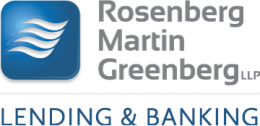The ABL Collision Course
Commercial lenders that originate asset-based lending (“ABL”) credit facilities are finding themselves in an increasingly competitive market. Large national banks grab the bulk of the multi-million dollar ABL credit line business. Lightly regulated non-bank ABLs serve smaller markets with loan facilities ranging from $3 million to $30 million. Community and regional banks seek to hold on to business in their geographic markets without sacrificing service or profits. Collisions among these ABL lenders are creating intense pressure to loosen underwriting standards, which might protect market share and boost short-term profits, but only at the risk of longer-term risks.
The attorneys at Baltimore’s Rosenberg, Martin & Greenberg LLP (“RMG”) have represented lenders in the ABL market for more than thirty years. We provide the legal advice that ABL lenders need to negotiate the strongest credit facilities and we help those lenders to recover collateral when ABL credit facilities fail to perform as anticipated.
Defining the ABL Collision Course
Lenders that offer ABL credit facilities generally fall into one of four categories:
- Large national banks;
- Larger non-bank ABLs that offer facilities in a range of $15MM to $50MM;
- Local and regional banks;
- Smaller non-bank ABLs that offer facilities in a range of $5MM to $15MM.
A significant portion of commercial ABL demand is for facilities in the range of $10MM to $20MM. Lenders in all four categories serve that market, which creates the potential collisions among those lenders.
Staying Profitable in the ABL Market
A lender will likely need to devote the same amount of effort and due diligence for a $10 million ABL credit facility as for a $100 million facility. The time and effort required to originate and service multiple small ABL loans can make them less profitable than a smaller number of very large loans. Technology can go a long way toward enhancing profitability, but the terms and conditions that govern ABL facilities will ultimately determine whether an ABL facility is as profitable as anticipated.
RMG’s attorneys have experience drafting and negotiating loan terms and conditions that help lenders to navigate possible collisions in the ABL market, and that give lenders greater confidence for both performing and non-performing credit facilities.
ABL Terms and Conditions
The key to strong lender protection in an ABL credit facility is clear definitions of all terms and conditions, including:
- eligible receivables, inventory, and reserves that form the ABL collateral, with appropriate restrictions on how those assets can be disposed of other than in the regular course of business;
- specific limitations on amounts of eligible receivables from any one customer, and on assets stored outside of any domestic jurisdiction;
- inclusion of “reasonable credit judgment” standards that are used to assess borrowing availability;
- cash management controls.
In all cases, RMG’s attorneys also verify that ABL credit and security agreements are internally consistent, that financial reporting requirements coincide with the borrower’s own reporting cycles, and that notice obligations and covenants are centrally defined to avoid confusion.
ABL Default and Asset Foreclosure
Even the most carefully underwritten ABL may go into default due to unanticipated business problems and downturns. RMG’s attorneys evaluate potential default situations to draft ABL documents that optimize a lender’s recovery of assets in loan foreclosure situations.
In default situations, we also advise lenders on:
- proper default notice terminology, including whether collateral forfeiture will be accepted as full or partial debt satisfaction, and an explanation of how the collateral will be evaluated;
- the borrower’s rights to object to any default, and how objections might affect the foreclosure process;
- segregation of liabilities among multiple borrowers;
- individual lender’s rights in ABL credit facility syndications.
Rosenberg Martin Greenberg: Attorneys for ABL Loan Institutions
The lending practice attorneys at Rosenberg Martin Greenberg provide attention at all stages of the ABL process, from negotiation, through drafting of term sheets and loan and security agreements, and (if necessary) through prosecuting foreclosures of defaults. We represent lenders in Maryland, Delaware, and throughout the Mid-Atlantic States. Please see our website or call us to speak with one of our ABL lender representative attorneys for more information on surviving ABL collisions and thriving in the credit facility loan markets.
Additional Resources:
- americanbar.org: Asset-Based Lending Credit Facilities: The Borrower’s Perspective. https://www.americanbar.org/publications/blt/2017/02/05_aiken.html
- abladvisor.com: Article 9 Foreclosure Sales – To Everything There is a Season. http://www.abladvisor.com/articles/9030/article-9-foreclosure-sales-to-everything-there-is-a-season
